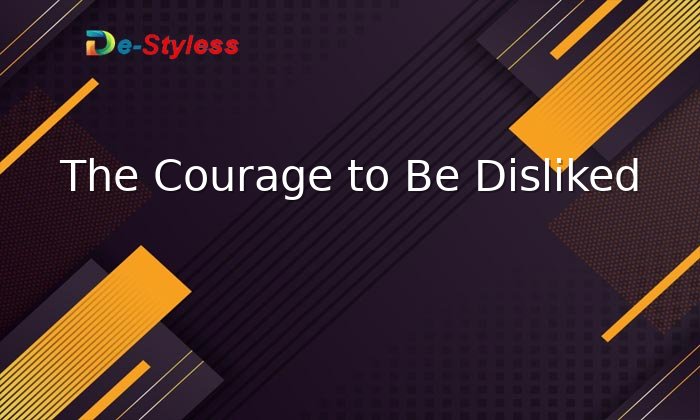The desire to be accepted and approved by others is deeply human. From childhood, people learn that validation brings comfort, while disapproval brings discomfort. However, the pursuit of universal approval often leads to self-betrayal, as individuals suppress their true identities to fit the expectations of others. To live freely and authentically, one must embrace the courage to be disliked.
This concept is not about seeking conflict or rejecting community. Instead, it is about recognizing that the opinions of others do not define self-worth. By developing inner strength and clarity, individuals can live according to their own values and principles, even if that means facing disapproval. True courage lies not in pleasing everyone but in daring to live authentically.
The Trap of Approval
Human beings are social creatures, and it is natural to care about the perspectives of others. Yet, when the need for approval becomes excessive, it leads to dependence and anxiety. Individuals begin to measure their success, beauty, or worth through external validation rather than internal conviction. Related article: Embracing The Gray Area
This approval trap creates a cycle that is difficult to escape. The more one strives to please others, the more fragile one’s identity becomes. Any criticism, rejection, or disagreement feels like a personal attack, even when it is not.
The Freedom of Authenticity
Choosing to live authentically requires the courage to risk disapproval. Authenticity means aligning actions with personal values instead of societal expectations. It is about acknowledging one’s unique identity, talents, and desires without apology.
The freedom of authenticity is profound. When individuals stop living for others and begin living for themselves, they discover resilience and peace of mind. Their confidence no longer fluctuates with external judgments, because it is rooted in inner truth.
Why Dislike Is Inevitable
It is impossible to be universally liked. People hold different values, preferences, and beliefs, and what resonates with one person may repel another. Attempting to satisfy everyone is not only futile but also exhausting.
Accepting that some people will dislike, misunderstand, or even oppose you is liberating. It removes the pressure to be perfect in everyone’s eyes and instead allows focus on living a meaningful life according to personal purpose.
The Link Between Boundaries and Respect
Courage to be disliked is closely tied to the ability to set boundaries. Boundaries communicate self-respect and protect against exploitation. While boundaries may disappoint others, they also invite healthier relationships built on mutual respect.
Paradoxically, when individuals accept being disliked for who they are, they often attract deeper connections. True respect does not arise from compliance but from authenticity and integrity.
Lessons from Adlerian Psychology
The idea of having the courage to be disliked draws heavily from the philosophy of Alfred Adler, a pioneer in psychology. Adler emphasized that the source of many struggles lies in interpersonal relationships and the desire for recognition. He argued that happiness comes from focusing on one’s own tasks and separating them from the expectations of others.
According to this perspective, courage is the decision to live one’s own life without being enslaved by the opinions of others. Disapproval loses its power once individuals realize that it does not diminish their inherent worth.
Building Inner Strength
Cultivating the courage to be disliked requires intentional practice. It begins with self-awareness—identifying personal values and recognizing when actions are driven by fear of rejection rather than authenticity. Self-reflection, journaling, or therapy can provide clarity in this process.
It also requires resilience in facing criticism. Instead of reacting defensively, individuals can learn to view criticism as information rather than condemnation. Some feedback may be useful for growth, while other feedback may simply reflect differences in perspective.
The Courage to Be Yourself
Ultimately, the courage to be disliked is the courage to be yourself. It is the recognition that worth is not earned through universal approval but through the act of living truthfully. The goal is not to provoke dislike, but to accept it as an inevitable byproduct of authenticity.
When individuals embrace this mindset, they free themselves from the exhausting need for constant validation. They can pursue meaningful goals, express creativity, and form genuine relationships without the burden of people-pleasing. In this courage lies the foundation of a fulfilling life.
Conclusion
The courage to be disliked is not about defiance for its own sake. It is about choosing integrity over approval, authenticity over conformity, and truth over fear. Disapproval will always exist, but it does not define one’s worth. Don’t miss: How To Build A Wardrobe Without Pinterest Boards
By daring to live authentically, individuals create space for deeper freedom, resilience, and connection. To be disliked is not failure; it is evidence of a life lived with honesty and courage. True fulfillment arises not from pleasing everyone, but from being true to oneself.
Glossary
- Authenticity: Living in alignment with one’s true values and identity.
- Approval Trap: Dependence on external validation to define self-worth.
- Boundaries: Limits set to protect personal well-being and integrity.
- Adlerian Psychology: A psychological approach emphasizing individual purpose, community, and the courage to be oneself.
- Self-Worth: An inner sense of value independent of external approval.
- Resilience: The capacity to withstand criticism and adversity without losing stability.





